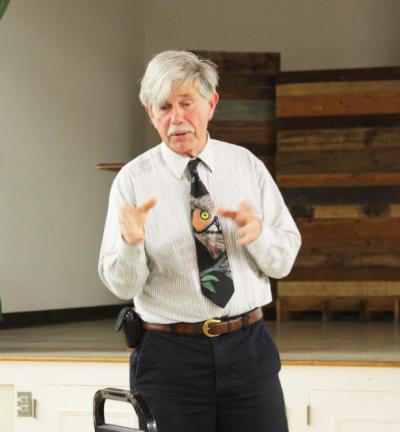Raptor researcher shares experience working with Massachusetts' largest owl
Raptor researcher Norman Smith, the director of Massachusetts Audubon Society's Blue Hills Trailside Museum, shared what he's learned in almost 40 years of studying the snowy owl on Saturday at a program sponsored by the Wareham Land Trust.
Smith captures snowy owls and other raptors, places bands and transmitters on them and then tracks them, many at Boston Logan International Airport. Along the way, he’s learned a lot of conventional wisdom about birds of prey isn’t quite right.
“If you Google snowy owls, 30 percent of the stuff you read is not true,” Smith said. The best way to learn about the birds of prey is to observe them. He recommends visiting Sandy Neck Beach in Sandwich during the winter to try to spot snowy owls.
The birds aren’t only found at the airport, though 752 in total have been captured there. On average, around 10 are removed from the airport each winter, but in the winter of 2013 to 2014, 120 snowy owls were removed. Some make their way to golf courses, Fenway Park and downtown Boston. Snowy owls typically begin to appear in November in Massachusetts, Smith said, and they stay through April.
Though the snowy owls have “perhaps the best hearing of any creatures on earth,” they’re able to tune out the noise of airplanes taking off. They enjoy the wide open space the airport provides. Snowy owls eat rodents, but their diet is more varied than researchers used to believe, Smith said. They eat water fowl, Canada geese (which are three times their weight), skunks and great blue heron.
Snowy owl numbers are declining because of changes in the environment, Smith said. They have less food since conditions in the Arctic are changing. Using less energy and fossil fuels can help make the environment safer for snowy owls and other birds of prey. Studying the top of the food chain with snowy owls can indicate how clean and safe an environment is, Smith said.
For more information or to make a donation to the Massachusetts Audubon Society, visit https://www.massaudubon.org/get-outdoors/birds-birding.















